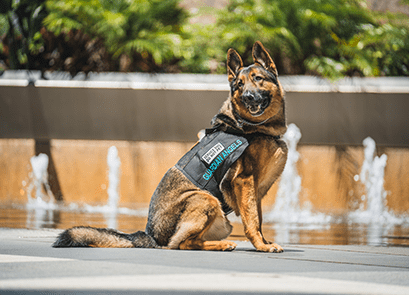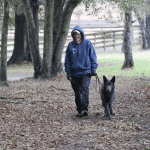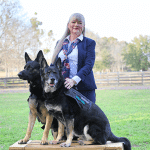Under Federal Law, there is no restriction as to who may or may not train a service dog, however, there are multiple elements to consider…
Do you know how to choose the most appropriate dog to become a service dog?
Over 60% of the dogs that start out in professional training programs, do not pass resulting in them being adopted out. These are dogs being trained by professionals that still didn’t make it. Not every dog has all the characteristics necessary to be a service dog. They must be large enough, brave enough, and intelligent enough to do the job. They can never present a public safety threat and must be able to perform their tasks 90% of the time or more despite being in crowds, stores, or any unusual environment. If your chosen dog doesn’t make it, are you prepared to rehome him/or her after spending a year or more in training and start over with a new dog in hopes the next one will pass the rigorous training?
Do you have experience doing some of the most advanced dog training skills?
Most pet dog trainers, military dog trainers, police dog trainers, etc., have never trained service dogs or studied disabilities. As a result, we created a college accredited 2.5-year program to teach apprentices how to become service dog trainers. There are multiple components to training a service dog that are not part of training for other types of disciplines, therefore most trainers or individuals would not know how to train a dog to alert on a certain high or low for diabetes, or alert in advance for a seizure, or how to know when to hit an emergency help button if you were incapacitated or an elevator button, or wake someone from a night terror, etc. Even if you get through the house manners, confidence building, socialization, basic obedience, public access practice, etc. and your dog can pass all these components, are you able to teach him the required advanced tasks that legally qualify him/her to be a service dog?
Are you familiar with ADA and state laws, HUD, DOT, VA, DOD, and DOT regulations?
The service dog laws and regulations are very convoluted and confusing even for attorneys and judicial systems, thus we teach the law to hundreds of various professional groups every year, as well as all the teams we pair. Are you prepared to know when your rights are being violated or if you are violating the rights of someone else or a business? Do you know that certain laws vary from state to state? Did you know that churches, cruise lines and other countries are exempt or do not recognize our laws and regulations?
Do you know the proper etiquette expected of a dog in public?
There are high expectations of a properly trained service dog in public. A service dog should basically be invisible unless they need to perform a task. There are rules regarding being in restaurants, grocery stores, airplanes, etc. in which your dog must behave accordingly. Are you familiar with and is your dog trained to these expectations?
Sadly, these are just a few of the variables that make training your own service dog very challenging. The advantage of going through a professional organization is that all these things are handled for you, we bare all the expenses of raising and training the dog and then donate them to qualified recipients. The disadvantage is that most credible organizations have very long waiting lists.





